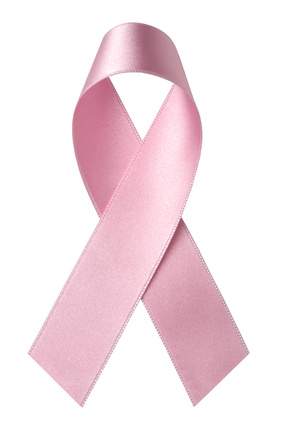Currently in the United States, a woman has about a 12.5% chance of getting breast cancer at some point in her life. Once diagnosed, this usually necessitates surgery, radiation and/or chemotherapy, and long-term therapy with an aromatase inhibitor that blocks the production of estrogen. Because of the many challenges that it brings, both physical and emotional, there is great potential for impact on a woman’s sex life. How a woman defines her sexuality before the diagnosis of breast cancer will affect how she responds to the varied challenges.
On the physical side, the first challenge a woman faces is that of surgery. Ranging from a lumpectomy all the way to a double mastectomy, surgeries are disfiguring, and can result in scar tissue and lymphedema. The result can be a reduction or elimination of sensation in the area, and discomfort or weakness with certain movements or positions. In addition to this, the sensations after radiation can be uncomfortable enough to want to avoid the area being touched or caressed. Next, we cannot ignore the significant effect that medications such as Aromasin (and many others like these) have an a woman’s sexuality. By blocking the production of estrogen, these can lead to discomfort and pain in the vaginal tissues, making the tissues very delicate and making it difficult to have vaginal lubrication.
After surgery, it is a natural tendency for a woman to feel disfigured. If a woman had previously defined her sexuality with her breasts, she may have difficulty feeling sexy after surgery which may substantially change her shape and leave her with scars. But sexiness involves all of her physical body, not just her breasts, and more importantly, how she thinks and feels. A woman’s attitude about sex is what is most sexy – her ability to enjoy herself and get lost in the moment, as well as the ability to appreciate and be excited with a partner. Her breasts are only a small part of the bigger picture. Each woman should decide for herself how she wants to adjust her sex life to accommodate the changes that breast cancer can bring. Some women will chose to do reconstruction, others will choose to wear their prosthesis to bed and carefully plan what she will wear that will be both sexy and strategic. Others prefer to use sexual positions that allow her to face away from her partner to make other parts of her the focus of attention. And some women feel comfortable not making any major adjustments. There is no right answer, only the answer that is right for you.
Emotionally, the most significant challenge is how a woman feels about herself and her sexuality after the diagnosis and treatment for breast cancer. She may experience depression, shame, anxiety, or anger. But the most helpful attitude for a woman (and her partner) to take is to focus on positive thoughts rather than on negative ones. This may seem simplistic, but it is the most powerful formula to achieve peace and to continue to foster her sexuality. In order to reclaim your sexuality after cancer, it is important to pay attention to all of the things that you still have rather than focus on what you have lost. A sense of sensuality, sexiness, and pleasure are all possible and can be nurtured. Having sensual nights (either by yourself or with your partner) in which you explore the different areas of your body that give you pleasure, is one way to remind yourself of the sexual and sensual pleasure that you are capable of. Remembering all of the ways that you experience that pleasure apart from your breasts will focus you with positive, sensual thoughts rather than with thoughts of loss. Your sexuality continues regardless of your diagnosis and treatment, and it is all under your control.
Communication is probably the most powerful tool a woman has at her disposal in order to continue to nurture herself as a sexual being. First, be honest with yourself about the many different feelings and thoughts that you encounter so that you can tangibly work with them rather than these having underlying effects on you. Next, it is important to be as open and direct as possible with your doctors. If you have a question about physical or emotional changes, or would like to find alternatives to different side effects of the medications, you will have to make this a focus of conversation at your next follow up visit. Since doctors are very focused on treatment, they may need some reminding of how important your sexuality is and how interested you are in maintaining your quality of life for yourself (and your partner if you have one).
Most importantly, communication with your partner helps clarify any worries or misunderstandings that each of you may have about the way that your sexuality and your sex life will be affected. It is often necessary for a woman to make the first move with her partner, even if it is just starting to dialogue about their sex life. Sometimes, opening up the lines of communication is the most crucial step, but can be as simple as asking your partner what they are thinking about in relation to the surgery. Oftentimes, a woman’s partner may be shy about asking for sex because they are trying to protect how the woman feels. A very common dynamic that arises is each partner trying to protect the other’s feelings and assuming that they will be uncomfortable or would rather avoid sex altogether. If that pattern continues, neither person will take the initiative to talk about how to reconnect in their intimate and physical relationship. Do not assume that you know what your partner is thinking or feeling. A woman needs to let her partner know what activities she would like to try, even if it is just cuddling, kissing, or caressing. As a woman recovers from her surgery and treatment, she may be more and more interested in getting back to her sex life with her partner, and telling her partner may be the only way they know when she is ready.
Even without a partner, fostering our sexuality after breast cancer is important for both our physical and emotional health. When we have sexual pleasure, we do our bodies a great service by increasing our blood flow and releasing chemicals in our nervous system that promote feelings of happiness and calm. Both our bodies and our mind work on the principle of “use it or lose it” so that if we don’t give ourselves attention, it becomes that much more difficult in the future to use it. Our creative mind that allows us to fantasize and get excited also benefits from regular attention. All of these factors play a part in our sexuality and our sex life that continues to evolve and change everyday.






Leave A Comment